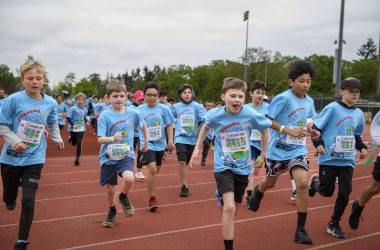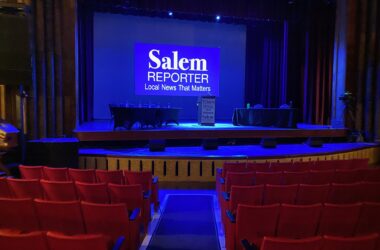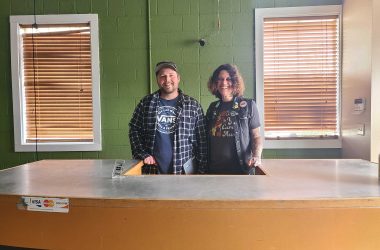At Pastor Ronnie Brooks’ request, about 100 attendees at a Black History Month event stood up, joined hands with their neighbors and repeated after him.
“I am a trailblazer. I am a leader. I will not, I shall not, ever give up on my family, my community and my country. Because I am a trailblazer,” he said.
A celebration of Black history and culture at McKay High School on Monday, Feb. 19, acknowledged the work of community leaders and reflected on the past, present and future of Salem’s Black community.
The BE BLAC Foundation organized the event in collaboration with Equity Splash, AFRHEEC, the Salem-Keizer branch of the NAACP and with help from the Salem-Keizer School District.
BE BLAC Executive Director Gregg Peterson said Salem has had annual Black history celebrations for around 14 years, but this year’s event had more collaboration to bring more of the community together.
“Black history is American history, and we want to make sure that we share history together,” he said.
The event featured speeches from local Black leaders, performances, an awards ceremony and provided a barbecue lunch to attendees. Anyone was welcome, and BE BLAC also offered free children’s books by Black authors to take home.
R.J. Hampton, president of the local NAACP presented the Black History Awards, which he said was the start of paying homage to those who had invested decades of work into the community and to serve as an inspiration to the next generation.
Local educators had the spotlight, including Cynthia Richardson, who was elected to the district’s school board last year. She took home an award for her community work. In 2003, Richardson became the first Black woman to be principal at McKay High School, was principal at North Salem High School until 2017 and directed equity, access and advancement in the district until her retirement in 2023.
“For someone who has been here working tirelessly within the school district, changing lives for not only students, but bringing in quality people into the district to make sure our students are represented by staff that look like them,” Hampton said.
Dr. Charlene Williams, the first African-American woman to direct the Oregon Department of Education, accepted an award. Her daughter Zaria sang the worship song “Because He Lives” to honor her mother.
“She came in knowing what needed to be done, how it needed to be done, and she’s so humble and gracious in the manner in which she approaches the work,” Richardson said while presenting the award, and that she’s someone who knew what children in the schools needed.
Dr. Nakeia Daniels, who was not at the event, was awarded for her work as the first African-American woman to direct the Oregon Department of Veterans Affairs. She was appointed in January.
Brooks, 71, was awarded for his steady community leadership.
He spoke about his family’s journey to freedom, starting with his grandfather, who was freed from enslavement in Galveston, Texas in 1865, and founded the first Black church in Decatur. Brooks’ father worked several jobs to help him get through college.
“One generation away from slavery,” he said. “My dad never got past the third grade, but his son was able to graduate from college with a master’s degree.”
Brooks said when he thinks about what he’s gone through, he thinks of a question posed by Dr. Martin Luther King Jr. ‘s book which asks: “Where do we go from here?”
He said that question impacts everything from upcoming decisions in the Salem-Keizer School District, encounters with the police and healing divisions of politics and in homes. He said, quoting King, that unity will come from hope and love.
“We have to learn how to come together and love each other. We have to understand that it’s love that will bring us together, it’s love that will keep us together. But it’s our hope and our determination that will cause us to go forward,” he said.
Hampton, in his speech, asked the audience to close their eyes and imagine being ripped away from their Salem homes by strangers. To imagine the sounds and smells of the cramped conditions of slave ships, to think of those who didn’t survive the journey.
“Where were they going to go from there?” he asked, echoing Brooks’ remarks. “If it wasn’t going to be in their lifetime, in their generation, what did they hope for their children? Their children’s children?”
Hampton said that’s when the work started, and it continues today.
“I’ll tell you where we go from here: we take the next step forward, and then we give it up to the next generation to take the next step forward,” he said.
For those who couldn’t attend, Peterson said there are plenty of ways to learn about Black history, through books or through watching PBS’ documentary series. He said if people want to help, they can advocate that Black history be taught in schools.
“The history is out there. If people really want to know, they’ll look for it,” he said. “Our schools, unfortunately, don’t have enough of it and we need to fix that.”
Contact reporter Abbey McDonald: [email protected] or 503-575-1251.
SUPPORT OUR WORK – We depend on subscribers for resources to report on Salem with care and depth, fairness and accuracy. Subscribe today to get our daily newsletters and more. Click I want to subscribe!

Abbey McDonald joined the Salem Reporter in 2022. She previously worked as the business reporter at The Astorian, where she covered labor issues, health care and social services. A University of Oregon grad, she has also reported for the Malheur Enterprise, The News-Review and Willamette Week.









